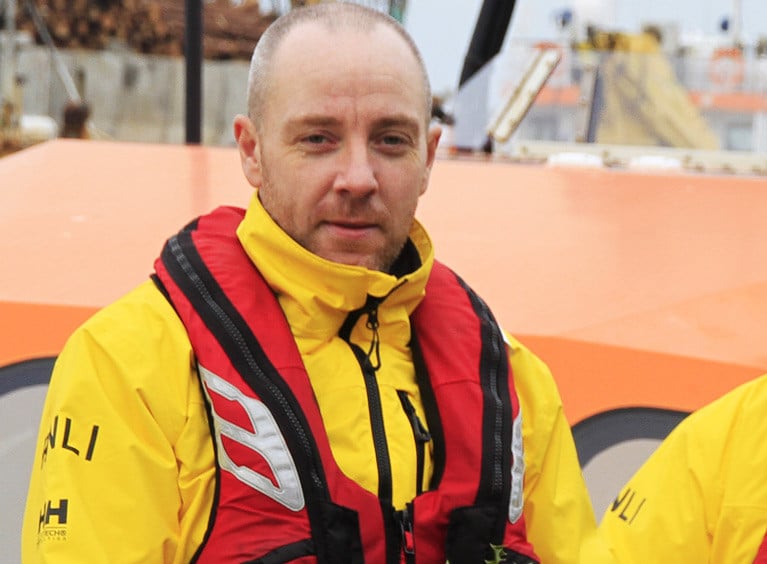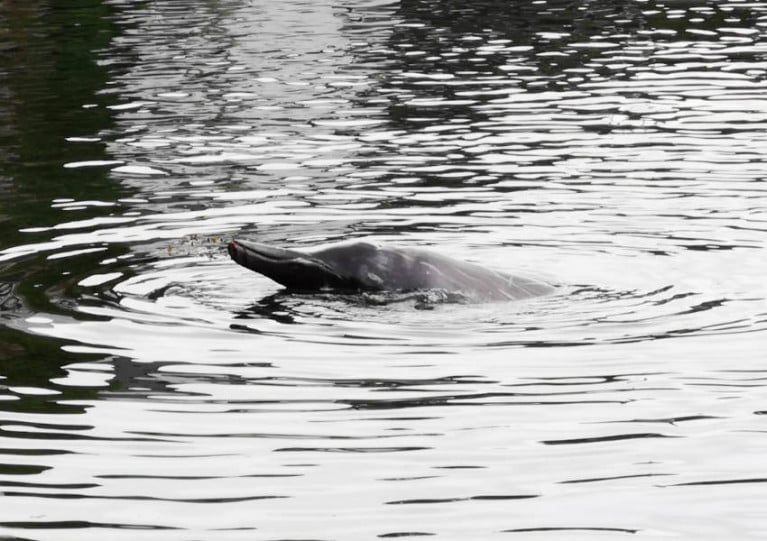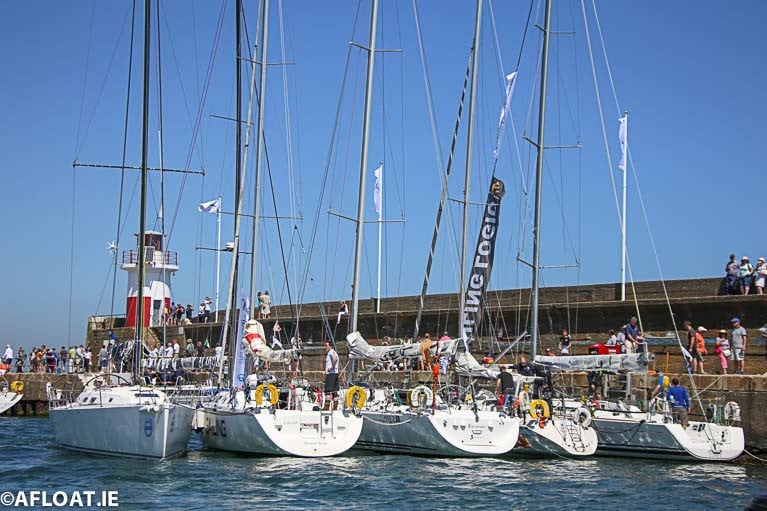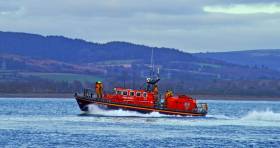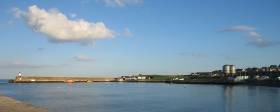Displaying items by tag: Wicklow harbour
Dome Returns to Wicklow Harbour Lighthouse After Almost 50 Years
The lighthouse at the pierhead of Wicklow Harbour’s east pier, is where a small group of people gathered shortly after first light on Monday, to watch a crane raise into position the original copper dome and lantern.
The copper dome reports The Irish Times, which were part of the lighthouse when built in 1884, have been restored after almost half a century. According to locals, the dome was blown away in a storm which they recalled took place in 1976 and that fishing crews from the area had rescued the dome and taken it to a boatyard across the harbour.
The boatyard however closed about three decades ago and so the whereabouts of the dome complete with lighthouse weather vane had become uncertain.
A replacement of the dome in the form of a flatter, lighter roof had been built and this structure survived until March as a particularly violent gust swept it clean off the top of the lighthouse tower.
After the weather related incident earlier this year, the remains of the original dome have since been fortunately discovered in a shed. The dome was in a flattened-out state, however the port which Wicklow County Council operate (with ships trading cargoes of timber, glass and scrap metal), contacted the boat-building and repair company, Arklow Marine Services to see if the rediscovered dome could be restored and put back in position.
John Tyrrell of Arklow Marine Services said “We were doubtful at first if it was feasible,” but another member of staff in the boat-building yard “said he would give it a go”.
A month after the violent gust took place, the upper part of the lighthouse, the lantern, which features the curved windows surrounding the light itself, was removed to Arklow to be reunited with the original domed roof.
Having been without its lantern since April, the work to restore this part of the lighthouse was carried out by Arklow Marine Services, noting the neighbouring port is where Afloat highlights a rare call of an Arklow Shipping cargoship took place in recent years.
The newspaper which has more including photos also has a comment from retired Wicklow postman, Pat Davis, who has spent his spare time painting and restoring 57 ‘mostly merchant ships’ murals as Afloat visited the port’s east pier wall.
Among the murals of vessels and ships that have called to Wicklow Port is the Naval Service CPV, L.E. Orla which after 30 years was decommissioned in 2022, the general cargo ship Patricia, once owned by an Irish shipowner which are a rare breed!
In addition to further rare calls to the port by the world famous Scottish paddle steamer P.S. Waverley which visited Warrenpoint in May.
Sea Angling Business Complains of ‘Disgusting’ Discharge From Faulty Storm Water Pipe in Wicklow Harbour
The operator of a sea angling business in Wicklow Harbour has spoken out over a faulty storm drain pipe that has been pumping raw sewage into the water next to his berth.
Kit Dunne of Wicklow Boat Charters told the Wicklow People that he has brought the problem with the South Quay outflow pipe to harbour officials and local councillors “time and again” over a number of years.
“I’m investing in a new vessel at a cost of €300,000 and I don’t see how I can develop my business if my new boat is right beside a stinking sewer,” he said.
The harbour, which is also used regularly by Wicklow Swimming Club, was recently subject to a no-swim notice due to pollution from the storm water overflow.
Meanwhile, Cllr Mary Kavanagh recently engaged with Dunne on the matter and said she is following up with the relevant officials.
“Sewage shouldn’t be mixing with surface water and coming out of a overflow storm drain,” she said. “I don’t know yet what is causing it but it is totally unsatisfactory to have sewage going into the harbour. The smells are appalling and you can only imagine the damage that is being caused to marine and sea life.”
The Wicklow People has more on the story HERE.
Wicklow RNLI Lifeboat Assist Fishermen on Vessel with Engine Failure
Three fishermen were brought to safety on Saturday evening (14 January) by the crew of the Wicklow RNLI lifeboat after their 15-metre vessel developed mechanical problems while fishing for whelk off the Wicklow coast.
The all-weather lifeboat RNLB Joanna and Henry Williams slipped its moorings at the south quay at 11:30 am, following a crew pager alert and proceeded north to the casualty's last reported position.
At 12:15 pm, the drifting fishing vessel with three crew was located near the East Codling buoy. Weather conditions in the area were sea state rough with a three-metre swell; the wind was strong gusting north easterly force 7- 8 at times.
Coxswain Ciaran Doyle assessed the vessel, which was found to have engine failure. As the vessel had no propulsion and was unable to return to port under its power and with the deteriorating weather, it was decided the best course of action was to tow the vessel back to Wicklow.
A towline was established, and the course was set for Wicklow harbour at 12:45 pm.
Speaking after the callout, Coxswain Ciaran Doyle said, “We located the fishing vessel drifting 18 miles north-east of Wicklow harbour, conditions at the scene were challenging, but the crew worked well and had no difficulties preparing a towline. The tow home was slow due to the weather, and we had to adjust the towline on a couple of occasions to suit the conditions.”
The fishing vessel was brought alongside the east pier at Wicklow harbour at 5:30 pm and the three fishermen were landed safely ashore.
This is the first callout of 2023 for the Wicklow RNLI lifeboat volunteer crew. When going afloat, we would remind everyone to check their engine and fuel, always wear a lifejacket or buoyancy aid, and carry a means of calling for help. If you see someone in difficulty on or near the water, dial 999 and ask for the Coast Guard".
Wicklow RNLI Launch to Assist Fishermen
Wicklow RNLI all-weather lifeboat RNLB Joanna and Henry Williams launched at 8:10 am this morning (Monday 1 November), to investigate a report of a ten-metre fishing vessel in difficulties north of Wicklow harbour.
The lifeboat was alongside the drifting fishing vessel twenty minutes later. After a quick assessment, It was found to have a rope fouled in the propeller and unable to get back to port. Coxswain Keogh decided the best option was to tow the boat back to Wicklow harbour. Weather conditions at the scene were moderate sea with good visibility.
A tow line was established, and the fishing vessel was towed into Wicklow harbour and secured alongside the South quay at 9:30 am.
With the three fishermen landed safely ashore, the lifeboat returned to station.
Wicklow Harbour on the east coast of Ireland had an unusual visitor this week with the arrival of the Danish platform ship Wind from Wales.
The 55m long and 18m wide ship that is heavily involved in the offshore wind industry only visited the south quay at Wicklow for 24 hours or so but made an immediate impression with her unusual platform rig.
Wind has since returned to the other side of the Irish Sea and is currently berthed in Liverpool.
RNLI Volunteer Peter Byrne participated in his first callout as Wicklow all-weather lifeboat launched shortly after 10:05 pm on Wednesday night (15 July), after a member of the public reported seeing a windsurfer having problems getting ashore near Brittas Bay beach as darkness fell.
As the lifeboat proceeded south to the last known reported position, more information was relayed from the Coast Guard and it was confirmed that the craft was, in fact, a trimaran.
The lifeboat was on scene at 10:23 pm and began a search, conditions in the area were calm with good visibility. At 10:35 pm contact was made with a solo sailor on a 16-foot trimaran near Potter’s Point. He had secured his boat on the beach and was waiting for the tide to turn before resuming passage north and no assistance was required.
Once Coxswain Nick Keogh was satisfied the sailor required no further assistance, the lifeboat was stood down by the Coast Guard and returned to station.
Following the call out, Wicklow RNLI Press Officer Tommy Dover said: ‘We would like to commend the vigilant member of the public who contacted the Coast Guard, fortunately, the sailor did not require assistance.’
The crew on the callout were Coxswain Nick Keogh, Mechanic Brendan Copeland, Tommy MacAulay, Graham Fitzgerald, Connie ‘O Gara and Peter Byrne.
Rarely Sighted Beaked Whale Dies In Wicklow Harbour
A Sowerby’s beaked whale — of a marine wildlife species rarely sighted in Irish waters — has died after getting into distress in Wicklow Harbour, as The Irish Times reports.
According to the Irish Whale and Dolphin Group (IWDG), the male whale stranded near Wicklow Sailing Club after losing its bearings yesterday morning, Saturday 4 July.
Sowerby’s beaked whales are one of four out of 22 beaked whale species known to be in Irish waters. They normally inhabit deep waters below 200 metres in the North Atlantic, and are rarely seen by humans.
“From the outset it appeared to be in poor health, appearing disorientated and having difficulty moving. Therefore, it would not have been a candidate for refloating,” the IWDG said in a statement on Facebook.
“Euthanasia is also extremely difficult in these circumstances due to the large size of the animal as well as public safety concerns.”
The whale will be recovered for a full post-mortem to try and “to find out more about the life of these rare and enigmatic whales”, said IWDG chief executive Dr Simon Berrow.
Ten months ago a Sowerby’s beaked whale stranded on a beach near Helvick Head in Co Waterford. While it was refloated twice by local lifeboat volunteers, it was thought unlikely to survive.
Hope That Wicklow Harbour Improvements Will Be Ready for Round Ireland Yacht Race in August
Round Ireland Yacht Race organisers are hoping that the package of measures announced by Marine Minister Michael Creed for Wicklow Harbour last week will be in place for the biennial race that starts in 12 weeks time.
Wicklow harbour was awarded €95, 000 for upgrading work on its piers as part of a €3.1m package to assist 10 coastal local authorities in 58 development and repair projects.
€33,750 has been allocated for the upgrading of existing and installation of new ladders with handrails along the North and South Quay.
€61,875 has also been provided for minor improvement works at Wicklow's East Pier to include the installation of vertical rubber fenders; Installation of LED lighting; Replacement of damaged railings and installation of new railing at certain points. There is a provision of power and water points; improvements to steps leading to the water at the top of the Packet Pier and lifeboat end; Installation of three new ladders; Installation of two to three small bollards between existing bollards to increase capacity/ reduce crossover.
The race starts from Wicklow on August 22nd and already has 39 entries registered.
Good news for Wicklow Harbour hopefully the ladders can be done in time for the rescheduled @RoundIreland on Aug 22nd @WicklowTownTeam @wicklowcoco pic.twitter.com/35xY32VCLF
— Wicklow Sailing Club (@WicklowSailing) May 20, 2020
Nothing Found In Search For Man Missing From Wicklow Harbour
#RNLI - Wicklow RNLI expressed their concern for the family of a man missing in the Wicklow Harbour area since Tuesday (27 December).
As previously reported on Afloat.ie, a multi-agency response was launched on Tuesday morning after the man, said to be in his 40s or 50s, was reported missing when his clothes were found in the harbour.
Wicklow’s inshore and all-weather lifeboats joined Garda and Irish Coast Guard units in a co-ordinated search from Six Mile Point to Wicklow Harbour and south to Brittas Bay.
The multi-agency operation also involved Civil Defence, the Irish Underwater Search and Recovery Unit and volunteer divers from Wicklow Sub Aqua Club.
Speaking after the search operation, Wicklow RNLI volunteer lifeboat press officer Tommy Dover said: “Our volunteer crews were tasked by the coastguard to assist with the search over three days; they undertook extensive searches of the shore line and out to sea and completed the final sweep of the area as light faded on Thursday evening.
“Unfortunately the person was not located, and our thoughts are with the family at this time.”
Search For Missing Man In Wicklow Harbour
#Missing - RTÉ News reports on the ongoing search for a man in his 50s reported missing in Wicklow Harbour this morning (Tuesday 27 December).
Wicklow RNLI, the Irish Coast Guard and gardaí are all involved in the operation that began around 10.30am.
The news comes two just days after a man was rescued from the River Liffey in Dublin city centre on Christmas morning, as previously reported on Afloat.ie.



























